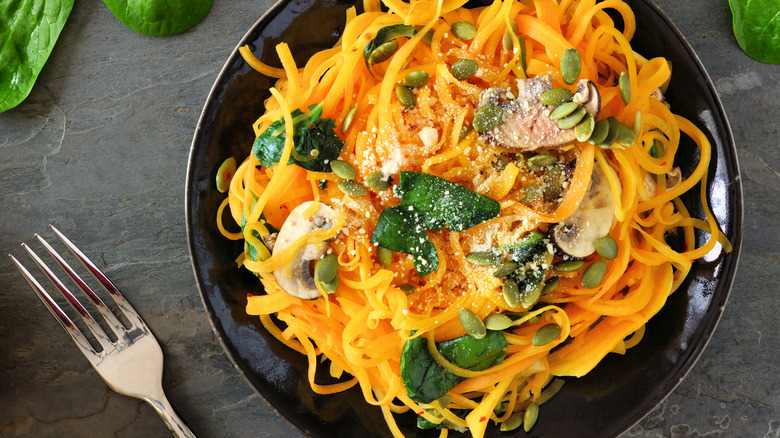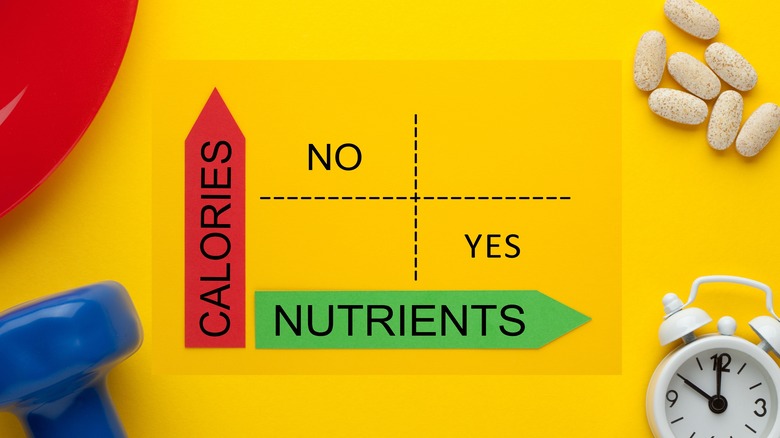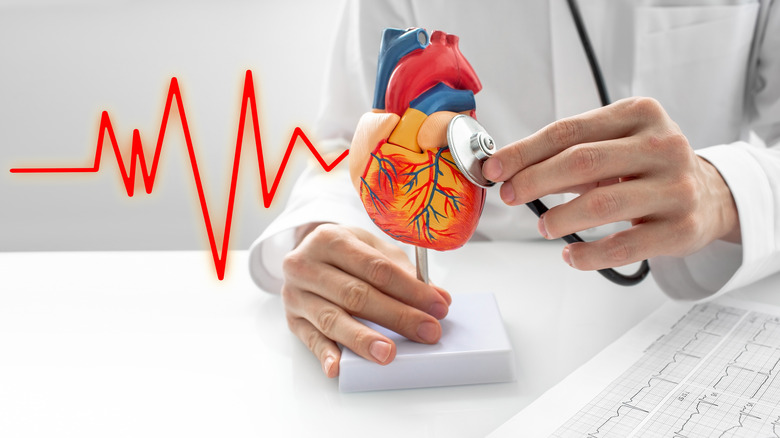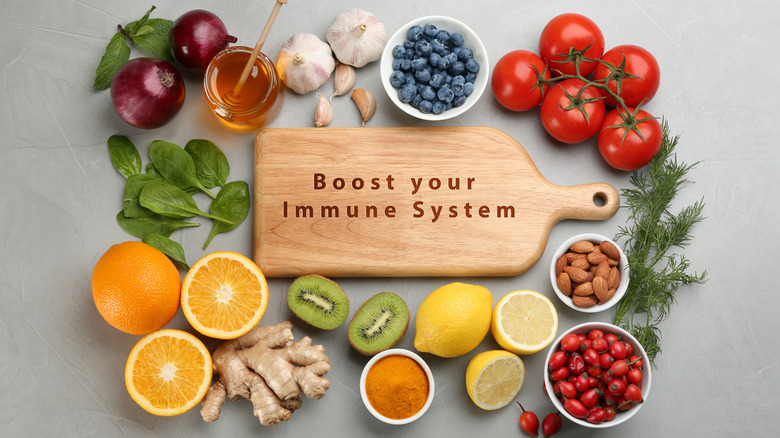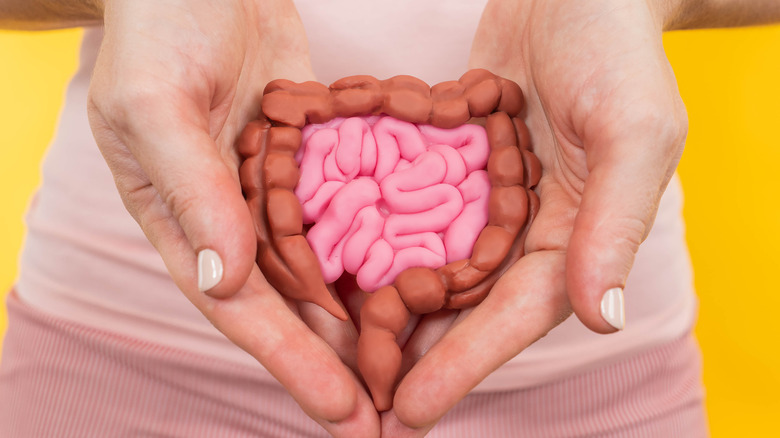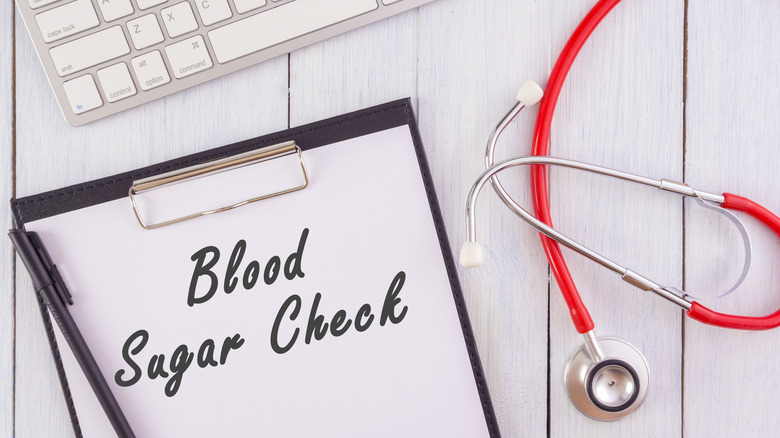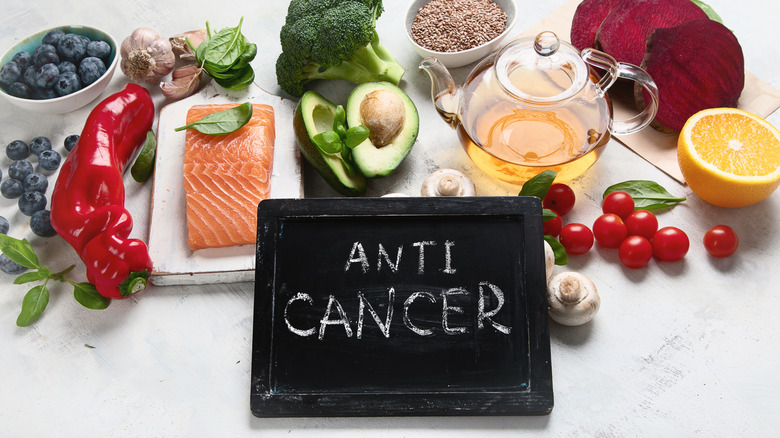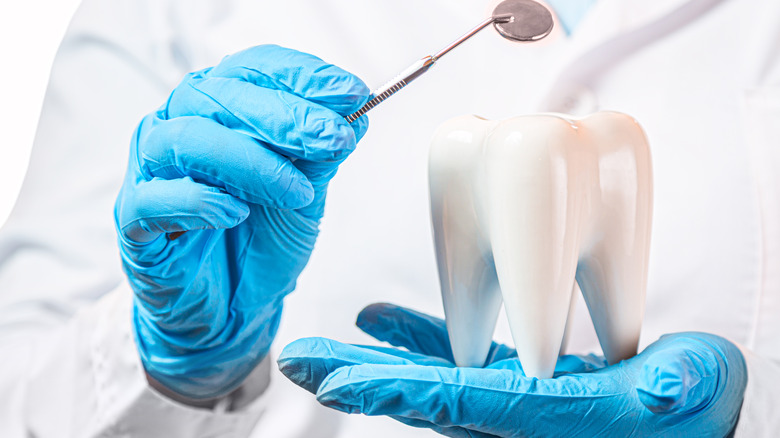When You Eat Spaghetti Squash, This Is What Happens To Your Body
The era of swapping pasta for veggies is here and squash — along with its cousin, zucchini — is here for it! Spaghetti squash is a winter squash that belongs to the Cucurbita pepo species, which are native to America and have been domesticated for over 8000 years all the way from Southern Canada to Argentina and Chile, per a 2019 study published in the journal Applied Sciences. You can find squashes in numerous shapes and sizes, ranging from flattened to cylindrical and from white to yellow, orange, dark green, and even black. However, you're probably most familiar with the oval ones that come in a yellowish shade.
Spaghetti squash is a hearty winter favorite due to its rich nutty flavor and nutritional profile. Plus, aside from being a low-carb, low-calorie, and gluten-free ingredient, it is also paleo-friendly (via Healthline), which makes it a kitchen must-have for anyone following vegan, vegetarian, keto, paleo, or gluten-free diets. Furthermore, it is incredibly versatile. According to the Applied Sciences study, like most squashes, you can eat spaghetti squash raw or cooked, and it has numerous uses in the kitchen. You can add it to salads and soups, bake it into bread or biscuits, eat it like pasta, enjoy some spaghetti squash pancakes for breakfast, or try a spaghetti squash pie for dessert. In addition, its high fiber and vitamin content may offer some health benefits. Here's what can happen if you eat spaghetti squash every day.
You'll consume a lot of nutrients for very few calories
If you're trying to lose weight, foods that pack a punch of nutrients while keeping a low calorie count make great additions to your diet. And as it happens, spaghetti squash is one of those foods. According to the United States Department of Agriculture (USDA) Food Data Central, a 1-cup (155 grams) serving of cooked spaghetti squash provides just 42 calories, 10 grams of carbs, 1 gram of protein, and less than a gram of fat.
Additionally, it packs 9% of the Daily Value (DV) for vitamin B6, 8% of the DV for fiber, 7% of the DV for manganese, and 6% of the DV for vitamin C. The DV of a nutrient is the amount you should aim to consume — or not exceed — per day, and its percentage shows how much a serving of food contributes to said daily nutrient intake, as explained by the Food and Drug Administration (FDA).
Furthermore, according to a 2019 study published in Applied Sciences, members of the Cucurbita species (such as spaghetti squash) are rich in beneficial antioxidant compounds known as carotenoids and tocopherols, which you can find in yellow and orange fruits and veggies. These compounds help fight the damaging effects that oxidative stress has on the body. Moreover, while the flesh has a low protein and fat content, spaghetti squash seeds — which are also edible and delicious when roasted — are high in protein and healthy fats.
You'll have healthier bones
When you think of nutrients that help improve bone health, you probably automatically think of calcium (and maybe a few people also think about vitamin D). However, most people don't know that vitamin C also has a vital role to play when it comes to healthier bones — and luckily, you can get plenty of vitamin C through spaghetti squash.
According to a review published in the journal Current Drug Targets, human studies show that vitamin C can benefit bone health by boosting bone mineral density (a measure of how strong your bones are) and improving markers of bone metabolism. That said, it's worth noting that while vitamin C can hunt free radicals to prevent oxidative stress damage to your bones, high doses of it may actually end up increasing oxidative stress, thus becoming detrimental.
Furthermore, per a 2020 review published in Nutrients, vitamin C may also play a role in the development and prevention of osteoporosis, a condition characterized by brittle bones (or as its name implies, porous bones), which increases the risk of fractures and disability in the elderly. The review states that vitamin C may help strengthen your bones by inhibiting osteoclast activity and stimulating osteoblast maturation, two types of bone cells in charge of bone turnover. Osteoclasts act by breaking down bone tissue and releasing minerals into your bloodstream, while osteoblasts promote bone formation.
You'll reduce your risk of heart disease
Heart disease is ranked as the number one cause of death in the United States, according to the Centers for Disease Control and Prevention (CDC). Fortunately, enjoying a warm bowl of spaghetti squash can nurture your heart, both literally and figuratively speaking. This is because of the protective effects of antioxidant compounds such as vitamin C and carotenoids, as well as the fiber present in the squash.
Per a 2018 review published in The American Journal of Clinical Nutrition, studies have associated higher intakes of vitamin C and carotenoids with a reduced risk of heart disease. The authors believe that the beneficial effect comes from these compounds' ability to lower inflammation — which keeps your arteries from clogging, a risk factor for heart attack and stroke known as atherosclerosis (via Healthline).
Meanwhile, a study published in Nutrition Reviews explains that higher fiber intake is linked to reduced rates of heart disease, because it helps lower blood cholesterol levels and significantly reduces blood pressure. In addition, it helps manage many other risk factors for heart disease, such as diabetes and obesity. For instance, fiber improves insulin sensitivity, lessens inflammation, and helps reduce body weight by reducing visceral fat, the type of fat located around the belly that's associated with adverse health effects. Thus, don't think twice about enjoying a serving (or two) of spaghetti squash next winter!
Your immune system will be stronger
Have you ever been told that sipping on some orange juice — or any citrus juice — will help you get better when you're under the weather? Well, you can thank citrus fruits' vitamin C content for this all-time favorite home remedy, the same vitamin that's behind spaghetti squash's immunity-boosting effect.
According to a 2017 review published in Nutrients, vitamin C is an essential vitamin — meaning that your body can't produce it, so you must get it from foods — that plays quite a number of roles in protecting you from disease, and its deficiency has been associated with a higher susceptibility to infections.
For instance, vitamin C helps protect the integrity of your skin, which acts as a barrier against external elements, including harmful microorganisms. It also protects white blood cells (your body's defense cells) from damage, helps them reach sites of infection, and promotes their ability to kill invading microorganisms. Moreover, vitamin C also seems to help reduce both the symptoms and length of the common cold. Therefore, spaghetti squash can make a great addition to your winter menu, which, aside from being a seasonal delight, can help you strengthen your immune system.
You'll improve your digestion
Fiber is a nutrient that the human body can't digest, but still provides a plethora of health benefits to those who consume it (via the Mayo Clinic). However, the latest Dietary Guidelines for Americans (DGA) considers fiber a nutrient of public health concern for Americans due to its low intake, explaining that its underconsumption is linked to health concerns.
While fiber does so much more than just help you become regular, it is primarily known for its beneficial effect on digestion and gut health. According to the Mayo Clinic, since it cannot be digested and absorbed, fiber passes through your digestive system relatively intact, but depending on the type of fiber, it can help with bowel movements and stool consistency, thus aiding and preventing constipation.
Furthermore, per a 2017 study published in Gut Microbes, some fibers can be classed as prebiotics or food for your gut's friendly bacteria. This means that while you can't digest it, your gut microbiota can, and by doing so, they produce compounds known as short-chain fatty acids (SCFAs), which are beneficial to the host. Fortunately, by providing 8% of your daily fiber requirement per cup, spaghetti squash is considered a good source of this important nutrient, helping you easily and deliciously meet your daily fiber needs (via the United States Department of Agriculture (USDA) Food Data Central).
You may experience weight loss
While the keto craze brought spaghetti squash back into the spotlight, this low-carb pasta alternative is mainly known for being a weight-loss-friendly food that can help you either reach your weight loss goals or maintain a healthy weight without sacrificing flavor or portion sizes — and you got its fiber content to thank for that!
According to a 2019 study published in The Journal of Nutrition, fiber can help you feel fuller for longer, which reduces the amount of food you eat during the day. In addition, by limiting your ability to digest proteins and fats, it reduces the number of calories you absorb from these nutrients. Also, high-fiber foods such as spaghetti squash have a low energy density, meaning that they provide fewer calories per serving, thus aiding weight loss. In fact, the study showed that among its 345 participants, those with higher fiber intakes showed more significant weight loss results after 6 months.
Furthermore, simply swapping your regular spaghetti pasta for spaghetti squash can lower your meal's caloric content by 82%. This is because compared to spaghetti squash — which provides only 42 calories per cup — spaghetti pasta packs 239 calories in the same serving (via the United States Department of Agriculture (USDA) Food Data Central). Similarly, regular pasta provides over 4 times the amount of carbs, 8 times the amount of protein, and 3 times the amount of fats than spaghetti squash per serving.
You'll control your blood sugar
Diabetes is a condition in which your body has trouble managing your blood sugar, leading to dangerously high blood sugar levels. This has detrimental effects on your heart, kidneys, and vision, per the Centers for Disease Control and Prevention (CDC). Luckily, spaghetti squash will not only help you control your carb intake (a key factor for managing type 2 diabetes, according to Livestrong) but may also help with blood sugar control.
A study published in Nutrition Reviews explains that fiber has a protective effect when it comes to diabetes and that by managing blood sugar levels, people with diabetes could reduce the need for medication and insulin. Fiber helps reduce the amount of sugar your body absorbs when consuming carb-rich foods. In fact, per the study, high-fiber diets can lower your blood sugar levels after a meal by up to 21%. On the other hand, fiber improves insulin sensitivity. Insulin is the hormone in charge of getting sugar from your bloodstream into your cells to be used for energy, and insulin sensitivity is a measure of how effective the hormone is at doing its job (via Healthline). When it isn't, it is said that a person has insulin resistance, and their blood sugar levels will keep rising.
Improving insulin sensitivity is key to keeping your pancreas (the organ that produces insulin) from being overworked, which is vital for preventing insulin resistance (per the CDC). Insulin resistance can lead to prediabetes and type 2 diabetes.
You'll reduce your cancer risk
According to the Centers for Disease Control and Prevention (CDC), cancer is a disease in which abnormal or damaged cells start to divide and grow uncontrollably, invading other tissues and disrupting their normal function. Sadly, statistics show that it is the second leading cause of death in the U.S (via the CDC). Nevertheless, fruits and vegetables are known for having cancer-fighting compounds and nutrients, and spaghetti squash provides a couple of those.
Because spaghetti squash belongs to the Cucurbita pepo species, it contains a group of antioxidant compounds called cucurbitacins, which reportedly provide anti-tumor activities. Per a 2015 review published in Pharmacognosy Review, test-tube studies suggest that cucurbitacins inhibit tumor growth and promote the death of cancerous cells. Furthermore, another important antioxidant compound in spaghetti squash is vitamin C, which has its own cancer-fighting properties. For example, it prevents the formation of cancer-causing substances in your body, boosts your immune system's ability to fight it off, and keeps cells from mutating and becoming cancerous by reducing oxidative stress damage (via the National Institutes of Health).
What's more, spaghetti squash's fiber content can also help reduce cancer risk. According to a review published in Nutrients, since fiber arrives undigested to your gut, it gets fermented by gut bacteria, producing short-chain fatty acids (SCFAs), which have anti-cancer properties. Plus, because some types of fiber promote stool viscosity, it keeps cancer-promoting substances from being in prolonged contact with your gut cells.
You'll keep your dental health in check
Because of spaghetti squash's vitamin C content, enjoying a hearty bowl of this nutritious veggie can also help you care for your teeth. The National Library of Medicine explains that vitamin C deficiency leads to scurvy, a disease characterized by swollen and bleeding gums and badly formed and fragile teeth that are more likely to become infected.
Meanwhile, a 2019 review published in the International Journal of Environmental Research and Public Health states that vitamin C has a preventative effect on periodontal disease — that is, the diseases that affect the bones that provide structure and support to teeth and the oral cavity. According to the review, since periodontal disease is an inflammatory condition caused by an excess of reactive oxygen species (ROS), vitamin C may offer protection due to its anti-inflammatory and antioxidant activities, which help scavenge ROS. Aside from its preventative role, the vitamin may also help slow down the disease's progression.
Your vision will improve
You've probably heard before that eating carrots is great for your vision, which is true thanks to their carotenoid content (per Healthline). However, carrots are not the only vegetable around with vision-improving effects. According to a paper published in the journal Advances in Nutrition, carotenoids such as beta-carotene, lutein, and zeaxanthin can be found in orange and yellow vegetables and fruits such as pumpkins, sweet potatoes, and, you guessed it, winter squash.
The paper indicates that beta-carotene is an antioxidant compound with pro-vitamin A activity, meaning that they get converted to retinol or vitamin A in the intestine, a critical vitamin for eye health. In addition, lutein and zeaxanthin are essential for macular health (the yellow part of the retina in human eyes) since they help reduce the risk of cataracts and macular degeneration — the main cause of vision loss in the elderly, per the National Institutes of Health (NIH).
What's more, in addition to spaghetti squash's carotenoids, other antioxidants like vitamin C can also help improve your vision. According to a study published in The Journal of Nutrition, some evidence links low antioxidant levels with an increased risk of cataracts, a clouding of the eye's lens that also leads to vision loss (per Livestrong). The study determined that increasing dietary intake of vitamin C could lead to a 64% reduced risk of cataracts.
You'll boost your mental health
Did you know that spaghetti squash is also a good source of pyridoxine or vitamin B6? According to a 2021 study published in Stress and Health, this vitamin has beneficial effects on emotional health, including reducing depression, irritability, and tiredness due to its stress-reducing properties. In fact, according to the study, research in over 3.000 people found that low vitamin B6 levels were linked to higher anxiety and depression risks.
Similarly, another recent study published in The Journal of Affective Disorders determined that since B vitamins are involved in the development and functioning of the brain, their deficiency is linked to higher rates of psychological disorders. Therefore, adding spaghetti squash to your diet might help boost your mental health, especially if you combine it with other B vitamin-rich foods. For example, you could enjoy a pyridoxine-loaded meal by eating spaghetti squash with marinara sauce, tuna or salmon, and a side of spinach, chickpea, and raisin salad (via the National Institutes of Health).
If it's too bitter, it may lead to toxic squash syndrome
Despite spaghetti squash's multiple health benefits, coming across a bitter squash can have a tremendous detrimental effect known as toxic squash syndrome, which some even describe as life-threatening. According to a report published in the Canadian Journal of Emergency Medicine, a 64-year-old woman developed unexpected weakness, nausea, vomiting, diarrhea, and abdominal pain after consuming bitter juice from calabash, an edible plant that, like squash, belongs to the Cucurbitaceae family.
The report explains that this is due to the plant's cucurbitacin content, which, aside from its cancer-fighting properties, could be toxic to humans when consumed in high amounts. You can quickly identify this due to its bitter flavor.
Still, as stated by Well+Good, spaghetti squash's health benefits outweigh this potential downside. So there's no need to stop eating it at all! Simply discard it if it has an abnormally bitter taste — which, after all, is nature's way of warning you that a food might be poisonous or toxic.
People with pumpkin allergy may have allergic reactions
Cross-reactivity is a phenomenon that happens when people with a food allergy react to other foods that either contain the same allergen (the protein responsible for the allergy) or that contain another allergen with a similar structure, which their body can confuse and attack as well (via The Doctors Library). This is especially common in people with nut allergies. However, research suggests that it may also happen within foods that belong to the Cucurbitaceae family.
For example, according to a study published in The Journal of Allergy and Clinical Immunology, members of the Cucurbitaceae family are reportedly one of the most allergenic foods in the U.S. Among them, pumpkin can produce IgE-mediated reactions — meaning that your body releases an antibody called Immunoglobulin-E to attack a pumpkin protein that it mistakenly identifies as harmful (per The Mayo Clinic). Thus, since spaghetti squash and pumpkins belong to the Cucurbitaceae family, people with pumpkin allergy have a higher risk of cross-reactivity when consuming spaghetti squash.

